CDP(June, 2019)
While visiting Japan in June 2019, CDP Chairman Mr. Paul Dickinson had a dialogue with the Senior Executive Officer and Head of CSV Strategy for Kirin Holdings at the Spring Valley Brewery in Tokyo.
Chairman, CDP
Mr. Paul Dickinson
Senior Executive Officer, Kirin Holdings Co., Ltd. (Head of CSV Strategy, Group Environment Manager)
Ryosuke Mizouchi
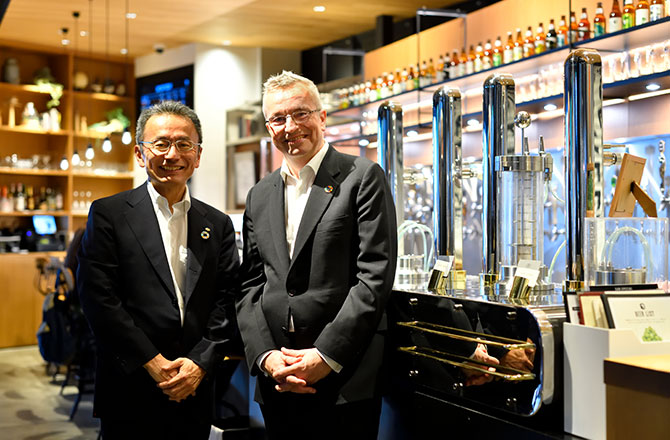
A Wind-Powered Craft Brewery
- Mr.Mizouchi:
- First of all, I know you are busy attending seminars, meetings, and symposiums with a myriad of companies and investors, so I want to thank you for taking the time to meet with me.
- Mr.Dickinson:
- While it has been yet another day full of meetings, I’ve enjoyed ending it in a nice craft brewery and a discussion about your company’s sustainability. Personally, I have an interest in companies that link sustainability to dominance on a business level. While companies such as airlines or those in the steel or cement industries grapple with the problem of high greenhouse gas emissions, emission levels for companies in the beverages business like the Kirin Group are typically quite low. Bearing that in mind, I would think that there is an additional challenge in reducing levels even further, right?
- Mr.Mizouchi:
- From the beginning, we haven’t been a business that generates a large amount of emissions, but despite that we have made considerable reductions when compared to the past and we intend to make even further reductions in the future.
- Mr.Dickinson:
- Are you using electric and gas power?
- Mr.Mizouchi:
- We utilize boilers for heating during the production of beer and soft drinks, meaning our fossil fuel usage is still relatively high. To reduce greenhouse gases, we are making a shift toward electric power. In addition, we have begun efforts to utilize electricity generated from renewable sources, which we believe to be the most effective means of reducing greenhouse gases.
- Mr.Dickinson:
- Even though it’s a target that most likely can’t be reached in the short term, I do think it would be amazing if the Kirin Group were able to become carbon neutral.*1
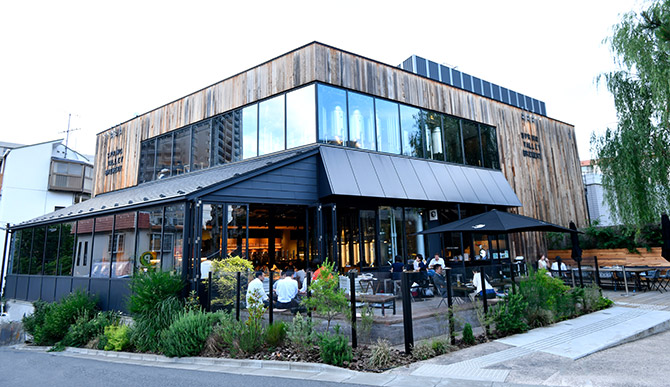
- Mr.Mizouchi:
- Truth be told, the Spring Valley Brewery is already powered by renewable energy, with 100% of its energy coming from certified wind power in Yokohama. On the other hand, large-scale breweries differ from small-scale breweries in that it’s not as simple making a complete shift to renewable energy in one shot. Since large-scale breweries are slotted for 15–20 years of use upon capital investment, we have a policy of installing the most energy-efficient and environmentally friendly equipment when the time comes for replacing aged machinery.
- Mr.Dickinson:
- Is the leadership behind these admirable efforts shared with your stakeholders?
- Mr.Mizouchi:
- We try to share this information with all of our stakeholders—not just with our customers but also with our suppliers, distributors, and so on.
Greta Thunberg, a Generation Pushing for Countermeasures for Global Warming, and Dematerialization
- Mr.Dickinson:
- Efforts to reduce greenhouse gas emissions and introduce renewable energy require a large monetary investment. However, today’s youth see global warming as an extremely important issue, so I believe that any company that acts as a leader in this regard will have a leg up on competitors and will win the support of a large number of consumers. Greta Thunberg, the 16-year-old girl from Sweden held a strike from school to protest global warming with 1.5 million students striking in kind. When you consider the seriousness with which this young generation takes this problem, it seems likely that they will select the products of companies that show leadership in tackling this issue.
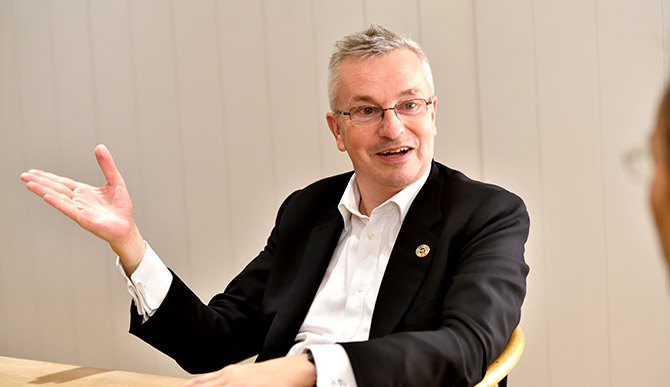
- Mr.Mizouchi:
- As consumers, young people are essentially exercising the same influence as ESG investment.*2 In Japan this isn’t just a matter of competition, and in fact, there is a growing number of companies that are placing importance on working together in order to resolve social issues. In that light, we are collaborating with competitors in the beer and beverage industry in regard to product delivery. In Japan, the lack of people willing to be truck drivers has become a social issue. Joint delivery allows us to reduce greenhouse gas emissions while addressing this social issue.
- Mr.Dickinson:
- The fact that this is a sector-wide initiative instead of the action of one company is one of great interest. At the same time, beer provides a means for people to gather and exchange ideas. Today’s society is fairly divided, so I do think it’s a wonderful thing that people are able to go out and interact with one another and have a good time while drinking your company’s beer. When we consume a lot of material goods it bears a burden on the planet and affects global warming, but I think it’s safe to say that enjoying yourself in this brewery does not have a big impact.
- Mr.Mizouchi:
- You’re talking about “dematerialization.” The Spring Valley Brewery is a shining example of it. Beer produced at a brewery needs to be delivered to a place where customers can drink it, and because liquids are heavy, they require a large amount of energy to transport. In addition, the products have to be packaged. In a place like Spring Valley Brewery, we are already at the point of production, so there is no need to transport heavy objects over long distances, and neither is there a need for the related packaging.
- Mr.Dickinson:
- I think that another effective step toward a low-carbon society is to move from a society focused on material goods to one that finds value in person-to-person interaction. This craft brewery provides a good model in that regard.
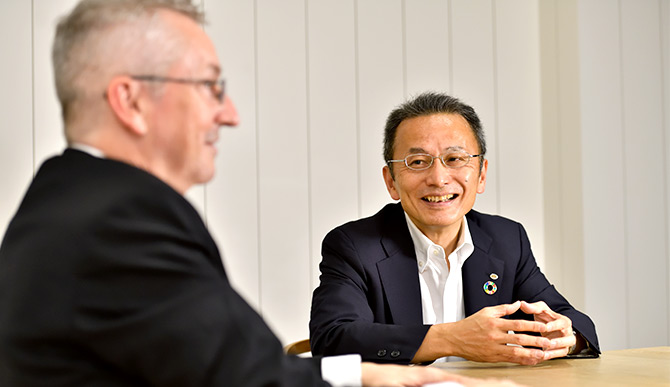
Becoming a Model Country for PET Bottle Recycling
- Mr.Mizouchi:
- While we are on the subject of packaging, I should point out that one of the major differentiating factors between the Kirin Group and other companies is that we maintain our own laboratory for packaging design and development. We have developed and produced numerous examples of the lightest product packaging in Japan, which has allowed us to reduce packaging materials, and reduce the amount of transport-related emissions and costs overall.
- Mr.Dickinson:
- Do you advertise this point on the packaging?
- Mr.Mizouchi:
- We don’t display anything about our greenhouse gas reductions, but one example of something we do display is the R100 mark in large font on the PET bottles for our non-caffeinated green tea to show that they are made of 100% recycled materials. We also put the FSC certification mark on our paper products, in line with our efforts to completely switch over to FSC-certified paper by 2020. That said, I think we still need to improve our communication regarding these efforts a little further.
- Mr.Dickinson:
- How are things in terms of PET bottle recycling?
- Mr.Mizouchi:
- Japan has a high return rate for PET bottles, but the ratio of bottles that are used to make new bottles is still rather low. PET bottles can’t be converted to a usable resin for new bottles unless the old bottles are lightly rinsed, so for this we need some cooperation from consumers as well. However, I am confident that Japanese consumers understand well the significance of recycling and the importance of following rules to make recycling possible. Companies in Japan are addressing this issue collaboratively as well. We intend to put our best foot forward so that Japan can be a model country for PET bottle recycling.
- Mr.Dickinson:
- That’s a great initiative and an enjoyable one. Plastic is a major problem for the UK as well. On the other hand, if you can show that you are taking measures to resolve this problem, I’ll bet that a large number of consumers will want to buy your products. I think that the standards that consumers use to determine the best product are changing. When I published the book Beautiful Corporations 19 years ago, I introduced the hybrid car as the best example of marketing for sustainable products. Perhaps in the future I may be able to introduce your beer, with its zero carbon footprint and 100% recycled packaging as the next example.
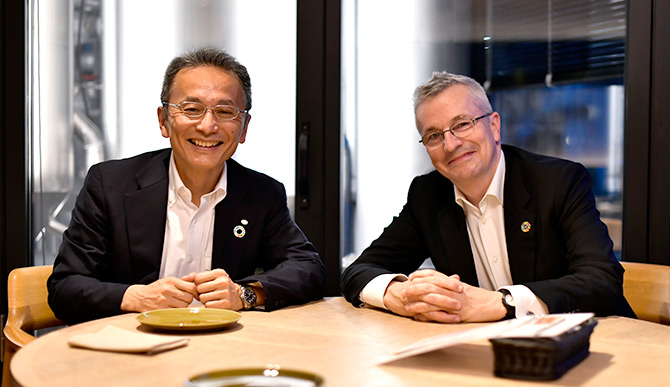
-
*1:Carbon neutral: The state where the amount of greenhouse gases emitted by a company that cannot be eliminated is offset by the amount of reduction or absorption carried out in other ways by the company to result in a virtual net zero effect.
-
*2:Investing made on the basis of whether or not a company gives consideration to environmental, social, and governance (ESG) factors